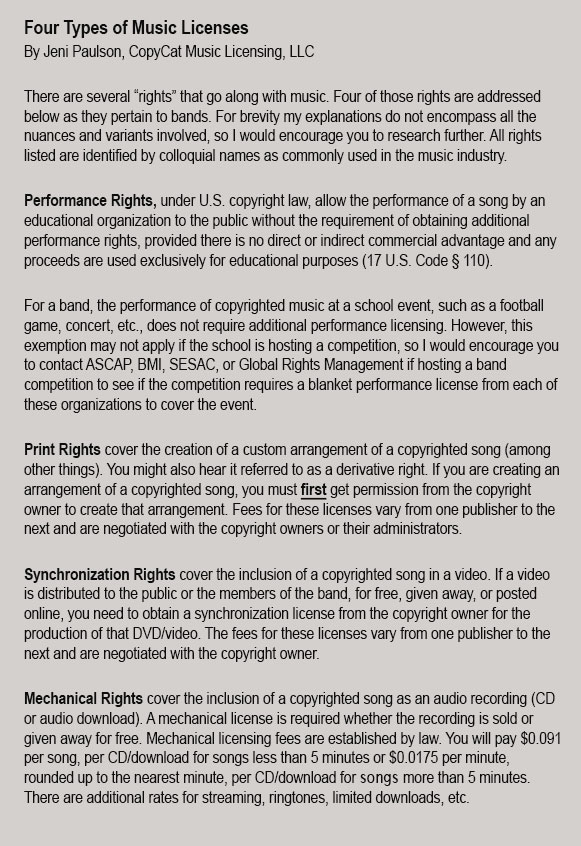Halftime Magazine last covered music licensing in 2013. Since then, a lot has changed regarding the release of marching performance videos. An understanding of synchronization licensing is the key.
Last season, Drum Corps International (DCI), WGI Sport of the Arts, and Music for All’s Bands of America suspended their Fan Network video streaming on-demand services. These popular subscription services allowed fans to view videos from recent competitions as well as their favorite historical shows. Next, the groups stopped selling past performance DVDs, and then came announcements that the most recent season’s DVDs would be cancelled or delayed. Why? It all comes down to music licensing.
Synchronization Explanation
Synchronization rights must be obtained anytime the performance of a copyrighted musical work is paired with video and distributed—regardless of profit made, intention, or educational/not-for-profit status.
The rights holders (music publishers, composers, or songwriters) determine the fee amount based on how and where the material will be used. Often it includes a flat fee and then a smaller additional fee for number of copies or views.
 With the advent of online video, music publishers began taking more notice that marching bands, dance teams, and show choirs were using copyrighted music and posting them online.
With the advent of online video, music publishers began taking more notice that marching bands, dance teams, and show choirs were using copyrighted music and posting them online.
“It was brought to our attention that we needed to take a couple of more steps to ensure that the appropriate permissions were put in place for anything that we had in the Fan Network related to interactive on-demand streaming,” says Dan Acheson, DCI executive director and CEO.
Ron Nankervis, WGI executive director and CEO, echoes the thought. “Almost two years ago, all the marching arts organizations were advised of additional licensing requirements for the Fan Network,” he says.
Music publishers enforce their rights by monitoring performances and cross-checking that the proper licenses were obtained. Often when groups or organizations are informed of an infringement, they are simply educated and then given a chance to obtain the proper license.
“We do collect data, and we do analyze the data, and if we find anomalies in the data that something hasn’t been licensed correctly, then we are to contact the ensemble where the licensing has not been done correctly and ask them to get their music licensed,” says Mark Greenburg, president of Tresóna Multimedia, a company that has exclusive agreements to handle custom arrangement licensing for many publishers.
On the DVD side, WGI and DCI have always requested licenses for DVD video products; however, the increased scrutiny requires more time and effort. If licensing for a certain part of a show cannot be obtained, the videos would be edited, but DCI tries to minimize this as much as possible and preserve the performance.
“The bottom line is that we needed to be more diligent to ensure that we actually have the license in hand before we release the product,” Acheson says. “We’re a little bit more deliberate now in making sure we have everything appropriately taken care of.”
What Will Happen Now?
Currently to avoid synchronization challenges, BOA, DCI, and WGI have switched to live video streaming. The broadcast of a live event requires simpler, less expensive “New Media” blanket licenses from ASCAP, BMI, and SESAC, the organizations that provide performance rights. Synchronization licenses are not an issue because the rights holders are paid under the blanket license, and the video is not a lasting product.
For now, live streaming seems to be a good temporary solution. These organizations hope to offer some kind of on-demand video in the future although not until the budgets allow.
“We must evaluate the cost and at what level we can provide services without making it an undue burden on all our other activities,” Nankervis says. “We have such a vast number of groups participating with WGI that even if we received answers on those licensing requests, the additional cost to now obtain streaming licenses could prove prohibitive.”
While the Fan Network probably will never return exactly as it was, other solutions and innovations are on the way.
“It’s no secret the trend is that everything’s digital,” Acheson says. “There’s not as much demand for [hard copy] movies or music. It’s all digital streaming like Netflix. We’re evaluating it right now, and we’re hopeful … because no matter how popular Blu-rays and DVDs are today for DCI, we know that a few years down the line, people are going to want to consume this on demand.”
How Do I Protect My Band?
As artists, marching members and organizations should be cognizant of the rights of songwriters and composers.
“All educators and arrangers and publishers are on the same page about one thing: Everybody agrees that rights holders should be properly paid and that songwriters should be able to make a living from the use of their music,” Greenburg says.
Acheson agrees. “What these copyright holders offer us is a gift to the marching activity,” he says. “And we have to respect that, and they should be recognized and compensated accordingly.”
Music licensing can create fruitful relationships in the music industry. “[Rights holders] are very happy when the marching bands use their music and license it properly,” Greenburg says. “[They] are very appreciative their rights are being respected because it’s very hard to make a living now as a music composer or songwriter. They have a good relationship with the marching band community and are appreciative of the business.”
While these recent challenges may have led band directors, show designers, and marching arts organizations to become wary of music licensing, asking questions, sharing knowledge, and battling misconceptions will go a long way to prevent problems.
“Don’t be afraid to ask questions,” says Jeni Paulson, president of CopyCat Music Licensing, LLC. “Don’t be afraid to do some research. Don’t be afraid to get a second opinion on a situation. Copyright isn’t as scary as it looks from the outside, so don’t be afraid to learn.”
Music for All’s website has an extensive copyright resources section with educational information that can apply to all levels and circuits. “Every copyright owner has a right to protect their works, set terms of use, and be compensated for the use of their works with few exceptions,” writes Music for All in its Copyright FAQ section. “These rights are not to be infringed upon any more than your right to free speech or privacy. Copyright is complicated not for the sake of being complicated, but rather to protect those parties’ interest in the ownership of their Intellectual Property.”
Before producing any DVD or posting a performance video, be sure that all proper licensing is obtained. While some one-composer works may be possible to license on your own, many modern songs have multiple songwriters and publishers, making it extremely difficult for a layperson to process the paperwork.
“If you’re creating a stage for marching music, somewhere along the lines, make sure that you’ve checked in with an attorney who knows this stuff and use the resources that are available out there to make sure you’re doing the right thing,” Acheson says. “There are a lot of myths out there about music when you’re a non-profit or when you’re in the education business. Fair use has applications, but it’s more of a myth for what we do. You’ve got to do maybe more work than you thought you needed to do.”


